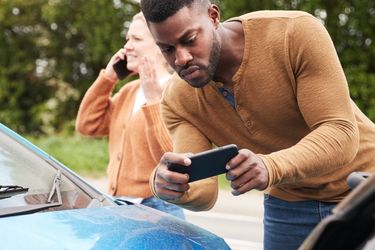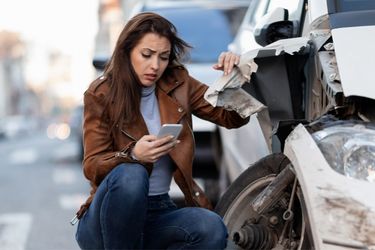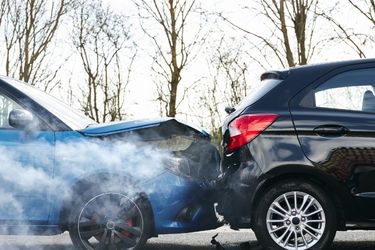
Written by Kayla Jane Barrie Updated on Feb 02, 2026 10 mins read

So, you’ve just been in a car accident. Now what? If you’ve never been in an accident before, and many drivers haven’t (thankfully), you may not know what to do next. Most are unsure about how to report car accidents in Ontario.
There aren’t many things more stressful than getting into a car accident. One out of three Canadians will be involved in a car accident sometime in their life – that’s 33% of us. In a high anxiety situation like this, we often freeze up – not knowing what to do next.
Do you call the police? Do you move your car or leave it where it is? Do you talk to the other driver? Do you fill out a car accident report? What about your insurer - should you call them? Don’t worry, this is why we are writing this article, to help you be prepared and know what to do, just in case you get into a car accident.
By law in Ontario, if the damage exceeds $5,000 (between both vehicles combined), you are required to file a police accident report. In Ontario, you should report any accident within 24 hours of it occurring. As of January 2025, drivers are now only required to report collisions to the police if the total damage to all vehicles and property involved exceeds $5,000. Previously, the amount was $2,000. Even if the damage is minimal and you decide not to file an insurance claim, you will have a record of the accident.
There are other situations where you will be required to report an accident in Ontario, even if there is no damage. Here is when you need to report a car accident:
It can be tempting to skip the accident reporting process and not involve the police or insurance, especially if you are in a minor accident. No one wants their Ontario car insurance to increase because of an accident, especially a fender bender. This is why many drivers consider making a deal with the other driver and offer to pay out of pocket.
Under the Highway Traffic Act, convictions for leaving the scene of a car accident in Ontario could include:
There are many other risks associated with failure to report an accident to the police and your insurance company.
Not reporting an accident can weigh on your mind and can have you second-guessing yourself and wondering if the decision not to report an accident will come back and impact your car insurance quotes in the future.
If someone hits your vehicle and they don’t report the accident, they could be charged with "Leaving The Scene Of An Accident". Failure to file an accident report is very serious. If you hit a vehicle and don’t stop, you may be subject to criminal prosecution.
Call the police if anyone is injured, if the total damage to all the vehicles involved appears to be more than $5,000, or if you suspect that any of the other drivers involved are guilty of a Criminal Code offence (such as driving under the influence of drugs or alcohol). Follow the instructions given to you by the emergency operator. Police will arrive as soon as possible, and do not try to move anyone injured in the accident — you may aggravate their injuries.
If no one is injured and total damage to all the vehicles involved appears to be less than $5,000, call a Collision Reporting Centre within 24 hours.
In Ontario, you should report any accident within 24 hours of it occurring. As of January 2025, drivers are now only required to report collisions to the police if the total damage to all vehicles and property involved exceeds $5,000. Previously, the amount was $2,000. Even if the damage is minimal and you decide not to file an insurance claim, you will have a record of the accident.
Can you report a car accident after 24 hours? If you have let 24 hours lapse, then you should report the accident immediately at your local accident reporting centre.
Many drivers make the incorrect assumption that this means you do not need to notify your insurer if the damage is less than the threshold. This is incorrect. Your policy states that you need to report all accidents, regardless of the amount of damage, even if you are paying for the repairs out of pocket.
Back into a car in the parking lot? Did your car get hit while you were in the store? Parking lot accidents should be treated the same as an accident on the road. Use the same rules above to assess the situation and your need to file an accident report. Call your insurer to notify them of the accident.
Remain calm
This may seem obvious that it’s not worth mentioning, but this is the most important thing for you to do. Remaining calm helps you keep your head clear so you can make the right decisions in the moment. Take a deep breath or two and collect yourself before doing anything.
Stay at the scene of the accident
You may be subject to criminal prosecution if you don’t remain at the accident scene.
Check yourself and passengers for injuries
Begin by checking yourself. Are you feeling pain? Can you move all your limbs? Ask other people in your car the same questions.
If it's safe, move your vehicle to the side of the road
How many times has traffic slowed to a crawl because of vehicles remaining in the active lanes on the road? If you are sure it is safe, move your vehicle to the shoulder. DO NOT get out of your car in live lanes of traffic. If your vehicle cannot be moved, put on your hazard signals.
Check that the driver and passengers in the other vehicle are unharmed
Before checking your car, you want to be sure that everyone is unharmed. Once you have confirmed all parties are okay, check the damage to your vehicle and take photos.
Call 911 immediately if:
If none of the conditions above apply, you should call the closest police station for instructions on how to proceed with reporting the accident. Some police stations will dispatch officers, and others will advise you to go to the closest Collision Reporting Centre.
NOTE: If a police officer doesn’t come to the accident, you are required to go to a Collision Reporting Centre within 24 hours.

Exchange information with the other driver involved
Before you leave the accident scene, make sure you exchange information with the other driver. Information you need to obtain includes:
Get an Accident Worksheet from the Financial Services Commission of Ontario website.
Write down information about weather, road conditions along with time and place of the accident as soon as possible
You want to be able to provide as much information about the conditions surrounding your accident as possible. The sooner you do this, the more likely it is that you will remember more details. This helps your broker or insurer, and (if necessary) the police, to understand the circumstances around the car crash.
Call a tow truck if you can’t drive your car
Many times, tow trucks will show up at the scene of the accident. If your car has been damaged so that you can’t drive it, you will need to be towed to an accident reporting centre.
Be wise when you engage a tow truck’s services. You’ve just been in an accident, and sometimes you are in a vulnerable state. Before a tow truck hooks up your car:
According to the Toronto Police Services, “A flat rate of $166 plus tax or, $188 plus tax will be charged by the towing company depending on if the vehicle was towed from a street or, a highway.”
You can get more detailed information on Tips for Avoiding Tow Truck Scams from FSCO.
Call the closest collision reporting centre
Find the centre nearest to your car crash on our collision reporting centre. Or phone 416-808-2222 (in the GTA) to locate the Collision Reporting Centre nearest to you.
Fill out an accident report
You will fill out a collision report when you get to the Collision Reporting Centre. An officer will then check the damage against your report to determine if the damage they can see is consistent with your report.
Report your accident to your insurance company as soon as you can
Your agent is there to help you. They will need some basic information about the accident to begin to process your claim. Be ready to provide:
This information will be on the form you fill out at the accident reporting centre.
There is a lot of misinformation about filing a police report after accidents. It is always a good idea to take precautions and call the police to find out whether or not you will be required to file one.
Filing a police report in Ontario is reasonably straightforward. You will be asked for specific information by a police officer at the scene or the accident reporting centre. Follow their instructions for filling out the required documentation.

It depends. Police may or may not come to the scene of an accident based on many factors, including the amount of damage if there are injuries and the location of the accident. Call the police, and they will let you know if they are en route to the scene or if you should visit an accident reporting centre to file a police report for the accident.
Filing a traffic accident police report does not mean that you are required to file an insurance claim. The police report is the record of the accident, and it will outline the details of what occurred. It can also help protect you because you don’t know what the other driver may do or say after the accident.
The information included in a police report for a car accident can vary based on the details of the accident, who filed the report, and where the report was filed. For example, a car accident police report at the scene will be different from the police report filed at a reporting centre.
The following information is typically included in a police accident report form:
Here are some of the benefits of filing a police report after a car accident:
Contrary to popular belief, car accident police reports will not impact your insurance company’s assessment of the car accident. It is up to your insurance provider to determine who is at-fault for an accident and whether or not you will see an increase in your rates, which helps keep your premiums lower when you renew your car insurance.
Now that you know what to do after a minor car accident, and understand the importance of reporting an accident and how to file a motor vehicle accident report, here are some things NOT to do after an auto accident:
You should know exactly what you are covered for. While your insurer can provide you with this information, the claims process will be less stressful for you if you clearly understand your specific Ontario car insurance limits.
Once your claim has been submitted, you will receive a call from one of your insurance company’s Claims Adjusters. Your adjuster will review your policy with you so you understand what you are covered for and which items the company will compensate you for. The adjuster can answer any questions you might have about the process.
If you have questions that you want to get answered at any time, reach out to your agent.
Being in a car accident is extremely stressful. Following these steps will help ease your stress and help to make sure that everyone is properly taken care of in the event of a collision.
If you suspect that you may be a victim or target of a scam or fraud, you need to immediately report it to the police.
You can file a report through FSCO’s Insurance Fraud Hotline. Go to www.fsco.gov.on.ca/TipNow or call 1-855-5TIP-NOW.
You can submit an anonymous tip to Crime Stoppers (1-800-222-TIPS).
Durham : 905-668-4157 (Ajax, Pickering, Whitby)
Barrie : 705-725-7025 (also for Bolton, Alliston, Beeton)
Belleville : 613-966-1834
Brampton, Mississauga : 905-453-2121
Mississauga 12 Division : 905-453-3311
Burlington : 905-331-0233
Cambridge, Kitchener, Waterloo : 519-653-7700 ext. 8786
Guelph : 519-829-4444
Hamilton Central : 905-521-1600
Hamilton East : 905-560-0510
Milton : 905-636-3100
Oakville : 905-825-4640
Scarborough : 416-808-2222
Toronto : 416-808-2222
Aurora, Newmarket : All collisions must be reported at the scene in Aurora. Call 911 and wait at your car.
King City, Markham, Richmond Hill, Vaughan, Woodbridge : 1-866-876-5423 ext. 7700
| Categories | Auto |
|---|---|
| Tags | AccidentsAuto Claims |
Read our insurance blog to get helpful tips, information and news.
Find out if a seatbelt ticket will raise your car insurance rates and how insurers view seatbelt violations.
Ontario’s Project CHICKADEE dismantled a $25 million auto theft ring. Discover how this massive bust targets export enablers and what it means for rising Canadian insurance premiums.
Think refusing a breath test helps your case? In Ontario, it results in a minimum fine of $2,000 and a criminal record. Compare the penalties and protect your future.
Impaired driving in Ontario is a serious offence. Learn about impaired driving fines, penalties, statistics and other important information all drivers in Ontario need to be aware of before they get behind the wheel.